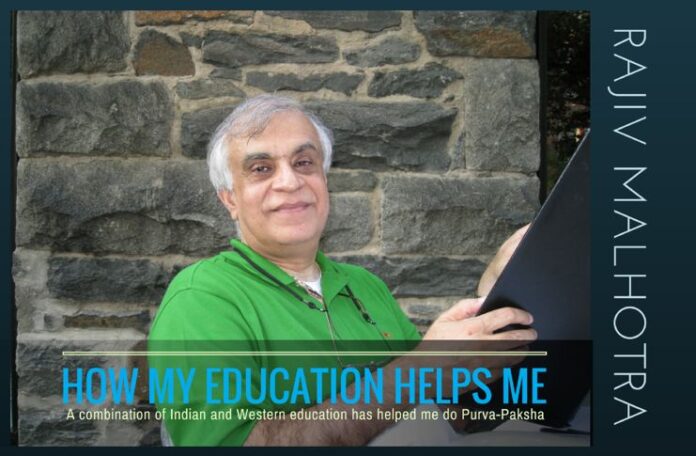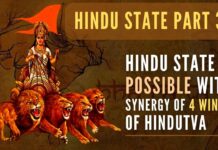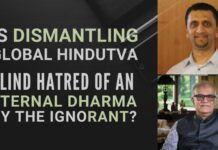
Since this matter keeps getting raised by some very narrow-minded Hindus in the middle of any and every kind of column, here is what I have to say:
[dropcap color=”#008040″ boxed=”yes” boxed_radius=”8px” class=”” id=””]M[/dropcap]y upbringing in family, my education, my professional circles and my social circles have been and shall remain a combination of both Indian and Western influences. I deny neither and I am glad to have the gift of both. I synthesize them into a coherent worldview which I am happy with.
We have an ancient Indian tradition of engaging the ‘other’ using a technique called purva-paksha. This means you must first study the other’s viewpoint very seriously and become an expert in it. Only then can you debate against it.
This is consistent with the globalization era and with the reality of my educational (=Western) and spiritual (=Indian) experiences that are a part of me. So it’s also a pragmatic matter of accepting what is a given.
To make matters more complex for the narrow-minded persons here, I have worshipped in every major religion of the world, have dear friends in each, have read their spiritual books, and have had numerous brainstorms with theologians in each in the spirit of learning. Furthermore, I intend to continue these practices.
My own sadhana is adhyatmika centric, and is neither history centric nor ritual centric. But I respect both those and also harmonize theme into my own views, while focusing my sadhana on the adhyatmika. I learnt a lot from Hindu, Buddhist and Sikh sources and practices. I was also influenced as a child by a sufi. I have gained a lot from some Christian mystics who I came in contact with years ago.
We have an ancient Indian tradition of engaging the ‘other’ using a technique called purva-paksha. This means you must first study the other’s viewpoint very seriously and become an expert in it. Only then can you debate against it.
[dropcap color=”#008040″ boxed=”yes” boxed_radius=”8px” class=”” id=””]B[/dropcap]ut today, I cannot find swamis who know the western ‘other’ well enough to be able to do purva-paksha of western thought. This is why their followers are lost, confused about identity and unable to effectively respond to the dominant culture. In the past in India, the ‘other’ would have been Buddhist, Jaina, Nyaya, Mimamsika, Vedantin, etc. and each had to be studied, but for today the ‘other’ is typically western dominated culture that must be studied.
To understand western thought one must master its three main branches: Christianity, Enlightenment, and Post-Enlightenment. Most Hindu preachers admit that their education did not include any of these. (Some do it as a matter of great pride.) So they lack a purva-paksha of the ‘other’ that matters so much in today’s global culture. Hence, by the methods of our own tradition, they are unqualified to be able to debate in the mainstream, and they are the blind leading their followers – the result is today’s catastrophes facing Hindus.
On the other hand, the west has invested serious resources to study Indian culture and thought rather than ignoring it. RISA is merely one example to prove my point. This started with the Jesuit College about 500 years ago that translated Sanskrit works into Latin (including many in science/ mathematics still not declassified by the Vatican). Later it became more sophisticated Indology in 19th century: EVERY major European university had Sanskrit text studies as a large department. Today this is done not by the British Empire but mainly by the US Government, the churches, and various US private foundations funded by MNCs wealth. Today’s South Asian Studies replaces colonial Indology as the west’s purva-paksha of Indian thought and culture.
This means the west has extracted knowledge from Indic sources and developed sophisticated positions about us. In many cases, the most qualified scholar available in a university about some Indian text or tradition is a westerner. That most swamis and their followers do not even know this state of affairs shows how out of touch they are with world.
So rather than attacking me for my background, one might also see in it a rare ability to do purva-paksha of the west from the Indian perspective: I have invested most of my time since the mid 1990s to study all three strains of western thought from works of serious thinkers. Rather than this being a handicap, it is what enables me to debate the ‘other’ with authority and confidence.
[dropcap color=”#008040″ boxed=”yes” boxed_radius=”8px” class=”” id=””]J[/dropcap]ust as a team needs specialists of many kinds and not all members with the same specialty, the Indian Enlightenment Project needs both the St. Stephens graduate and the DAV graduate, not either/ or. So why is Platonist so insecure with a sense of inferiority complex? Is it his lack of knowledge of his own tradition that makes him fear that he will be swept off by the winds of western influences?
800 Hindu temples in North America at a cost of about $2 billion, but lacking in intellectual content in most of them. They come across to the NRI youth as voodoo centers, doing some exotic ritual with no meaning.
Furthermore, how is his mentality different than that of fundamentalist Islamists? His comments are evidence that Hindu fundamentalism does exist as a serious menace today.
What this narrow mentality has produced is 800 Hindu temples in North America at a cost of about $2 billion, but lacking in intellectual content in most of them. They come across to the NRI youth as voodoo centers, doing some exotic ritual with no meaning. The pandits are ill-trained for 21st century discourse, many cannot communicate for nuts. Any sincere visitor who wants to appreciate Hinduism would be well advised to stay away from them, and instead to spend quality time with someone knowledge in discussions first. Hindu temples have failed to project Hindu culture to mainstream society. Proof: in all these controversies we have been engaged here on Sulekha, the temple-wallahs are lost, disinterested, and ignorant. They have failed to educate our own youth in ways that would equip them to face the issues with confidence and not to run from Hindu identity as being shameful.
They have failed because of the mentality exemplified by Platonist and others like him.
Many swamis told me point blank that they are disinterested in teaching about the sociopolitical realm as they find it irrelevant or even un-Hindu-like. While I respect that (especially since my sadhana is adhyatmika), I point out to them that Krishna’s teachings were in the kshetra (i.e. theater) and not in the clouds. The Avatar enters the theater of mundane life to teach how to live in the mundane kshetra.
So today’s teachings must be for today’s kshetra, which happens to be western dominated. Krishna starts with a SWOT analysis (SWOT means Strengths, Weaknesses, Opportunities and Threats) of both sides of the war, when he explains to Arjuna the capabilities of each of the main participants. This is called competitive analysis, an example of having knowledge of the kshetra – a very practical thing. No swami has yet been able to give a rejoinder to me than would show teachings to live in the modern kshetra (based on purva-paksha) to be improper or un-Hindu.
So far I have made two points above for being a successful Hindu today: Do purva-paksha of the west, and teach/practice in accordance with the modern kshetra.
My next question is: Should we go back in the past and try to recreate the past, or should we advance into the future? Unfortunately, most Hindus and anti-Hindus don’t understand our tradition in this regard. It is falsely viewed that these are mutually exclusive options, namely, that one must be either orthodox living in Vedic times or one must be a “progressive” person who has rejected the past.
[dropcap color=”#008040″ boxed=”yes” boxed_radius=”8px” class=”” id=””]A[/dropcap]brahamic religions are based on discontinuous changes, each caused by a new prophetic revelation that overruled the past and so they had to reject prior knowledge. Hence, they have this mutually exclusive choice-making forced upon them. Indian secularists brought this idea into India and most orthodox Hindus (lacking in proper purva-paksha of the west) simple accepted this way of thinking. So we have fights between Indian orthodoxy and progressives. Both are wrong.
Sampradaya is a river that flows. It is neither a static pond (fixed in the past) nor a waterfall with discontinuities (“progressives’ idea of advancement). It is both: the same as the past (in terms of overall categories) and new (in terms of content).
Indian traditions give you a combination: Change is not discontinuous but the new gets assimilated into the framework already in place. Notice how internet, computers, satellites, etc are being assimilated into Hindu culture. Notice how orthodox Islam is threatened by all this, and hence all its clashes with modernity. Hinduism is not anti-modernity. There was never a Shankaracharya who denounced scientific inquiry or progress, and hence the 200 years of wars between medieval Christianity and science were simply unnecessary in India.
Sampradaya is a river that flows. It is neither a static pond (fixed in the past) nor a waterfall with discontinuities (“progressives’ idea of advancement). It is both: the same as the past (in terms of overall categories) and new (in terms of content).
Western religion fixed its followers in the past until a new prophet would come to give them new instructions. Western science gave the people on-going change, but with no reference point to their past. So even today they are busy reconciling “science and religion,” whereas Indian culture never had this problem to begin with.
This is all because of the difference between history-centric religions and a-historical (Sanatana) dharma.
So I ask the reader, which is better for Hinduism’s future: my Indian-Western combined background rooted in an Indian framework, or Platonist’s DAV-only education that makes him what I would call a Hindu fundamentalist?
[dropcap color=”#008040″ boxed=”yes” boxed_radius=”8px” class=”” id=””]S[/dropcap]ince he simply refused to go away from our column thread about a completely unrelated topic, and has demanded that we deal with me and my “Stephens College background”, let us deal with his issues here. Why did he not post his position on a weblog and refer those interested to its url, so that the main thread would not get hijacked? What does this tell us about such a person’s intellect and intentions?
Each of us must play the hand as dealt to us, and neither try to undo the past (but focus on presently available choices) nor try to live someone else’s hand.
Also, notice that he has adopted the screen-name “Platonist”, which is hardly Hindu. Should we go on his case unrelentingly that he is unqualified to speak for Indian traditions, because he suffers from an inferiority complex and has adopted western identities?
Each of us must play the hand as dealt to us, and neither try to undo the past (but focus on presently available choices) nor try to live someone else’s hand.
I have a heart condition, asthma since childhood, and various other conditions and must live accordingly. I had certain family circumstances and a certain sequence of experiences in my past and must understand what is suitable for me to do today, based on my SWOT analysis of myself. So if my parents sent me to a certain school/ college and Platonist went to a different kind, we must each live today based on what’s best for each individual. This personalized dharma is called sva-dharma and is more sophisticated than the notion of standardized “commandments” for everyone.
Dharma is based on Vedic “rta” (patterns of reality) and cannot be translated as “law” (which is based on an external law-maker that is absent in authorless Vedas).
St Stephens College is past of my sanskara, as DAV is part of Platonist’s sanskara. The question is how well each of us is living today in accordance with our personalized sanskara and doing our best for the common good.
JFK said: ask not what your country can do for you, ask what you can do for your country. What has Platonist done for his culture which he says is so dear to him? Why does he not worry about that, rather than being obsessed about what I should or should not do? He is not my wife or parent, so why is he nitpicking about me?
If he was Donald Trump, he could be saying, “You’re fired!” and then he would simply move on to read other authors instead of me. That would be good for me. On the other hand, if I were Donald Trump, I would tell him, “You’re fired!” and tell him to get lost.
The point is that neither lives for the other person. Neither person is in bondage to the other. I left business life permanently in my mid 40s (a very unusual thing to do) to be free and let inspiration drive me. Why would I accept the bondage of so-called “followers” whom I did not select or accept, after having left the bondage of the job-business rat race? If I wanted to be measured/evaluated by others and forced to pursue “commitments” and to achieve “goals,” then why would I not be doing it in some lucrative business instead? Why would I pick a bunch of random individuals on Sulekha who have done little of their own on these causes and yet have massive expectations and even demands of me, and why would I make them the circle to be surrounded with?
I left behind ambitions – including politics, leadership of institutions and fan clubs. These are forms of bondage. So those who do not find me or my life or my work unacceptable do not have to hijack serious discussion threads. They merely have to abandon me and my writings I shall be most grateful to them.
Thanks for this opportunity to explain my side. I hope this will convince snipers to allow me and others to refocus, and to quit heckling on matters unrelated to a given column.
– Rajiv Malhotra
- Part 2: Discussion between Dr. Swamy and Rajiv Malhotra - September 10, 2017
- Dr Subramanian Swamy In Conversation with Rajiv Malhotra - July 24, 2017
- P2 – Discussing the Digestion of Yoga with a White Hindu - July 3, 2017










